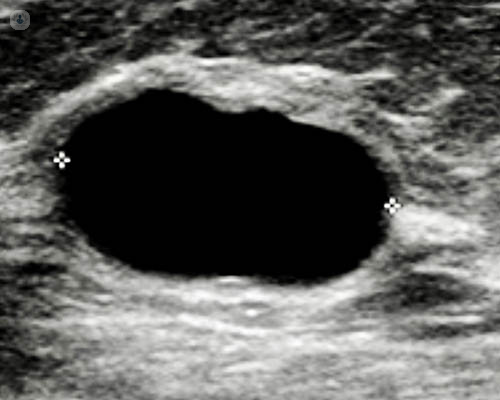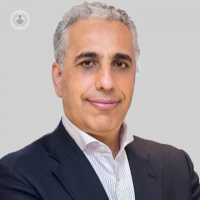What to do if you notice breast cysts
Written by:Simple breast cysts are fluid-filled tissue masses and represent aberrations of normal development and involution of lobular elements of the breast. It is lined with a layer of cells that secrete fluid. Breast cysts are benign and tend to occur in women aged 30-50 years and resolve after the menopause.
Here, one of London’s leading oncoplastic breast surgeons Professor Kefah Mokbel explains how common breasts cysts are and what you should do if you notice any lumps in your breasts.

What causes breast cysts?
Breast cysts can run in families and seem to be related to the sex hormone oestrogen and hormone replacement therapy (HRT) can maintain the cysts after the menopause. They are found in 20% of women and occur in both breasts in one-third of cases.
Clustered micro-cysts are seen in 6% of breast ultrasound scans predominantly in women aged 45-55. They consist of groups of tiny cysts measuring up to 3mm in size with a wall thickness of up to 0.5 mm. The cancer risk is considered to be too low to warrant a biopsy.
How are breast cysts diagnosed?

Any woman who discovers a lump in her breast should visit her family doctor and breast specialist for evaluation to establish the nature of the lump. The specialist will perform the usual tests to make a diagnosis – physical examination of the breast and an ultrasound scan (regardless of age) and a mammogram (if aged 40+).
A clinical examination usually shows the cyst to be a well defined fluctuant mass but the mass can feel like a solid mass (i.e. hard) if the cyst is tense due to the presence a large volume of fluid within it. The ultrasound features of simple cysts are usually diagnostic.
If the scan shows the cyst to be irregular (complex cyst) then a needle biopsy of the fluid or the wall will be performed to exclude cancer.
How are breast cysts treated?
Asymptomatic simple cysts do not usually require treatment. Cysts that are large or painful can easily be treated using a needle and syringe to aspirate the cyst fluid. The fluid obtained from the cyst is usually discarded unless it is blood-stained or there is a residual lump.
Blood-stained fluid can rarely be associated with early breast cancer, especially if there is a residual lump. In such cases it will be sent for further tests and other investigations will be required such as mammography and ultrasound-guided needle biopsy of the cyst wall.
Complicated cysts that have thick indistinct walls or contain intra-cystic masses, or thick barrier (septa) should be aspirated and subjected to biopsy.
Clustered micro-cysts do not require any further treatment. There is drug treatment for breast cysts however breast cysts in women taking HRT tend to resolve after HRT cessation.
If you would like to work with Professor Mokbel during your breast cancer journey, you can book an appointment with him via his Top Doctor’s profile here.


